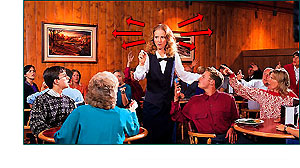A confusion can be defined as any set of factors or circumstances which do not seem to have any immediate solution. More broadly, a confusion is random motion.
If you were to stand in heavy traffic you would be likely to feel confused by all the motion whizzing around you. If you were to stand in a heavy storm, with leaves and papers flying by, you would be likely to be confused.
Is it possible to actually understand a confusion? Is there any such thing as an “anatomy of confusion”? Yes, there is.
If, as a switchboard operator, you had ten calls hitting your board at once, you might feel confused. But is there any answer to the situation? If, as a shop foreman, you have three emergencies and an accident all at the same time, you might feel confused. But is there any answer to that?
A confusion is only a confusion so long as all particles are in motion. A confusion is only a confusion so long as no factor is clearly defined or understood.
Confusion is the basic cause of stupidity. To the stupid all things except the very simple ones are confused. Thus if one knew the anatomy of confusion, no matter how bright one might be, he would be brighter.
If you have ever had to teach some ambitious young person who was not too bright, you will understand this well. You attempt to explain how such and so works. You go over it and over it and over it. And then you turn him loose and he promptly makes a complete botch of it. He “didn’t understand,” he “didn’t grasp it.” You can simplify your understanding of his misunderstanding by saying, very rightly, “He was confused.”
Ninety-nine percent of all education fails, when it fails, on the grounds that the student was confused.
And not only in the realm of the job, but in life itself, when failure approaches, it is born, one way or another, from confusion. To learn of machinery or to live life, one has to be able either to stand up to confusion or to take it apart.
We have in Scientology a certain doctrine (principle) about confusion. It is called the Doctrine of the Stable Datum.
If you saw a great many pieces of paper whirling about a room they would look confused until you picked out one piece of paper to be the piece of paper by which everything else was in motion. In other words, a confusing motion can be understood by conceiving one thing to be motionless.
In a stream of traffic all would be confusion unless you were to conceive one car to be motionless in relation to the other cars and so to see others in relation to the one.
The switchboard operator receiving ten calls at once solves the confusion by labeling, correctly or incorrectly, one call as the first call to receive her attention. The confusion of ten calls all at once becomes less confusing the moment she singles out one call to be answered. The shop foreman confronted by three emergencies and an accident needs only to elect his first target of attention to start the cycle of bringing about order again.
Until one selects one datum, one factor, one particular in a confusion of particles, the confusion continues. The one thing selected and used becomes the stable datum for the remainder.
Any body of knowledge, more particularly and exactly, is built from one datum. That is its stable datum. Invalidate it and the entire body of knowledge falls apart. A stable datum does not have to be the correct one. It is simply the one that keeps things from being in a confusion and on which others are aligned.
Now, in teaching an ambitious young man to use a machine, he failed to grasp your directions, if he did, because he lacked a stable datum.

A confusion exists when all particles are in motion.

It becomes less confusing when one item is singled out and becomes the stable datum for the remainder.
One fact had to be brought home to him first. Grasping that, he could grasp others. One is stupid, then, or confused in any confusing situation until he has fully grasped one fact or one item.
Confusions, no matter how big and hard to overcome they may seem, are composed of data or factors or particles. They have pieces. Grasp one piece and locate it thoroughly. Then see how the others function in relation to it and you have steadied the confusion and, relating other things to what you have grasped, you will soon have mastered the confusion in its entirety.
In teaching a boy to run a machine, don’t throw a torrent of data at him and then point out his errors: that’s confusion to him, that makes him respond stupidly. Find some entrance point to his confusion, one datum. Tell him, “This is a machine.” It may be that all the directions were flung at someone who had no real certainty, no real order of existence. “This is a machine,” you say. Then make him sure of it. Make him feel it, fiddle with it, push at it. “This is a machine,” tell him. And you’d be surprised how long it may take, but you’d be surprised as well how his certainty increases. Out of all the complexities he must learn to operate it, he must know one datum first. It is not even important which datum he first learns well, beyond that it is better to teach him a simple basic datum. You can show him what it does, you can explain to him the final product, you can tell him why he has been selected to run this machine. But you must make one basic datum clear to him or else he will be lost in confusion.
Confusion is uncertainty. Confusion is stupidity. Confusion is insecurity. When you think of uncertainty, stupidity and insecurity, think of confusion and you’ll have it down pat.
What, then, is certainty? Lack of confusion. What then is intelligence? Ability to handle confusion. What then is security? The ability to go through or around or to bring order to confusion. Certainty, intelligence and security are lack of, or ability to handle, confusion.
How does luck fit into confusion? Luck is the hope that some uncontrolled chance will get one through. Counting on luck is an abandonment of control. That’s apathy.